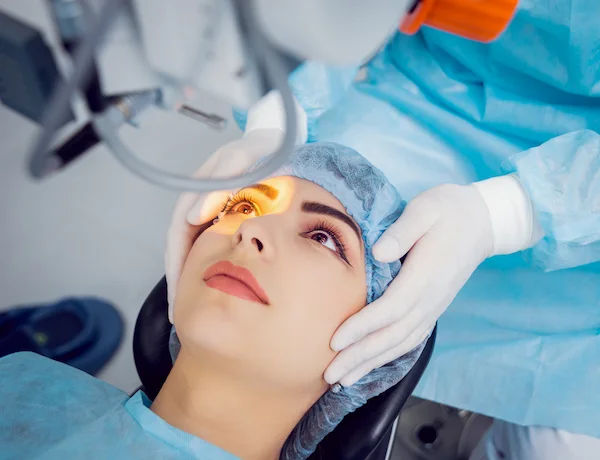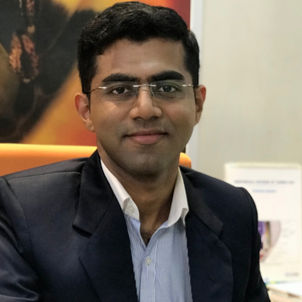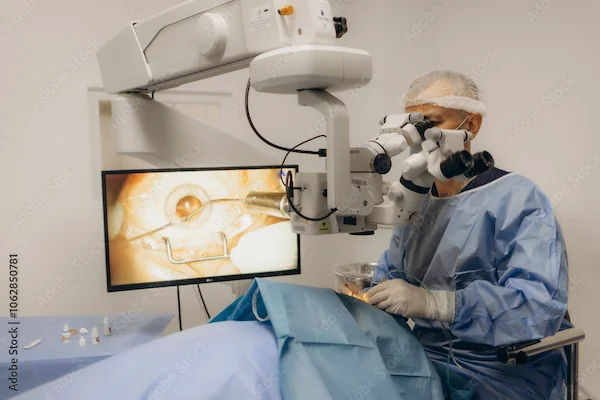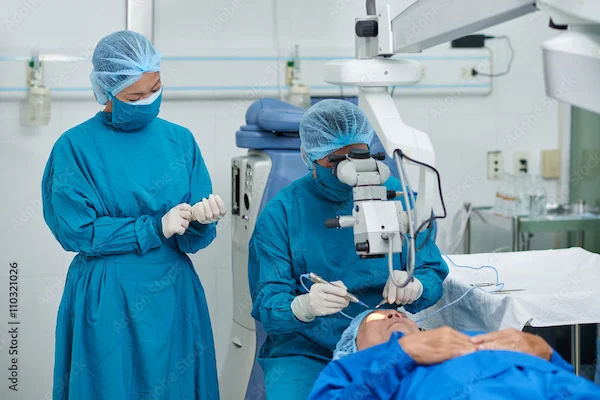How Is Cataract Eye Surgery Done?
Curious about how cataract surgery works? Learn how this safe, 30-minute procedure restores clear vision by replacing your cloudy lens with a new one.

Written by Dr.Sonia Bhatt
Last updated on 15th Jul, 2025

Introduction
Cataracts are a common eye condition, especially as we age. They occur when the natural lens of the eye becomes cloudy, leading to blurry vision, difficulty seeing at night, and faded colors. If left untreated, cataracts can significantly affect daily life. Fortunately, cataract surgery is a safe and effective procedure to restore clear vision.
In this article, we’ll explain what cataract surgery is, how it’s performed, and what you can expect before, during, and after the procedure.
What Is Cataract Surgery?
Cataract surgery is a procedure where the cloudy lens of the eye is removed and replaced with an artificial intraocular lens (IOL). This surgery is one of the most commonly performed and successful medical procedures worldwide.
Types of Cataract Surgery
Different surgical approaches are used depending on the severity of the cataract and the patient’s eye health.
1. Phacoemulsification (Small-Incision Surgery) – The most common method, where a tiny incision is made, and ultrasound waves break the cataract into small pieces before removal.
2. Extracapsular Cataract Surgery – Used for advanced cataracts where a larger incision is made to remove the cloudy lens in one piece.
3. Laser-Assisted Cataract Surgery – A more precise method where a laser helps in making incisions and softening the cataract before removal.
Consult Top Specialists for Personalised Eye Health Advice
How Is Cataract Surgery Performed?
The procedure is typically completed within 15 to 30 minutes and is done under local anaesthesia. You’ll be awake but will not feel any pain.
Before the Surgery
Here’s what usually happens in preparation for the procedure:
Eye Examination – Your doctor will measure your eye shape and size to choose the right artificial lens.
Medication Adjustments – You may need to stop certain medications temporarily.
Fasting (if required) – Some cases may require you to avoid eating before surgery.
During the Surgery
The surgery itself involves the following steps:
1. Anaesthesia – Eye drops or an injection will numb your eye.
2. Incision – A small cut is made in the cornea (front part of the eye).
3. Breaking & Removing the Cataract – Using ultrasound (phacoemulsification) or laser, the cloudy lens is broken and suctioned out.
4. Inserting the New Lens – An artificial intraocular lens (IOL) is placed in the same position as the natural lens.
5. Closing the Incision – The tiny cut usually heals on its own without stitches.
After the Surgery
Post-surgery, you’ll rest briefly at the clinic before heading home the same day. You may receive an eye shield and instructions to avoid touching your eye. Someone should accompany you as you won’t be able to drive immediately after.
Recovery and Post-Surgery Care
Recovery is usually quick, but follow these tips for the best results:
Do’s
Use prescribed eye drops to prevent infection and reduce swelling.
Wear sunglasses outdoors to protect your eyes from bright light.
Rest your eyes for the first few days.
Follow up with your doctor as scheduled.
Don’ts
Avoid rubbing or pressing your eye.
Skip swimming or heavy exercise for a few weeks.
Don’t drive until your doctor confirms it’s safe.
Most people notice improved vision within a few days, though complete healing may take a few weeks.
When Should You Consider Cataract Surgery?
Not all cataracts need immediate surgery. However, you should consult a doctor if you notice:
Your vision is blurry even with glasses.
You struggle with night driving due to glare.
Colours appear dull or faded.
Daily activities like reading or watching TV become difficult.
If you experience these symptoms, consult an eye specialist. Early treatment can prevent further vision loss.
Can Cataracts Be Prevented?
While cataracts are a natural part of ageing, you can reduce your risk by:
Wearing UV-protected sunglasses.
Eating a diet rich in antioxidants like leafy greens, carrots, and berries.
Managing diabetes and blood pressure.
Avoiding smoking and excessive alcohol.
Final Thoughts
Cataract surgery is a safe, routine procedure that can dramatically improve your vision and quality of life. If you or a loved one is experiencing cataract symptoms, don’t delay—consult an eye specialist to discuss treatment options.
Book a consultation with an ophthalmologist on Apollo 24|7 today and take the first step toward clearer vision!
Consult Top Eye Specialists
Consult Top Specialists for Personalised Eye Health Advice

Dr. Rajeev Gupta
Ophthalmologist
24 Years • MBBS, MS (Ophthalmology)
Ghaziabad
Om Eye & Gynae Centre, Ghaziabad
Dr. S Venkateswaran
Ophthalmologist
35 Years • MBBS, PGD (OPTHALMOLOGY)
Tiruvannamalai
Shiva Eye And General Hospital, Tiruvannamalai

Dr. Esha Trideep Kshatriya
Ophthalmologist
3 Years • MBBS , MS (OPHTHALMOLOGY)
Bhuj
KCRC-Blind Peoples Association, Bhuj

Dr. Balakrishna Balaka
Ophthalmologist
6 Years • MBBS, MS Ophthalmology
Visakhapatnam
Balakrishna eye clinic, Visakhapatnam

Dr. Chintan Dedhia
Ophthalmologist
10 Years • MBBS , MS (Ophthalmology), DNB (Ophthalmology), FLVPEI(Retina & Vitreous)
Mumbai
Shree Aadinath Eye & Dental Care Superspeciality Retina Clinic, Mumbai
Consult Top Eye Specialists

Dr. Rajeev Gupta
Ophthalmologist
24 Years • MBBS, MS (Ophthalmology)
Ghaziabad
Om Eye & Gynae Centre, Ghaziabad
Dr. S Venkateswaran
Ophthalmologist
35 Years • MBBS, PGD (OPTHALMOLOGY)
Tiruvannamalai
Shiva Eye And General Hospital, Tiruvannamalai

Dr. Esha Trideep Kshatriya
Ophthalmologist
3 Years • MBBS , MS (OPHTHALMOLOGY)
Bhuj
KCRC-Blind Peoples Association, Bhuj

Dr. Balakrishna Balaka
Ophthalmologist
6 Years • MBBS, MS Ophthalmology
Visakhapatnam
Balakrishna eye clinic, Visakhapatnam

Dr. Chintan Dedhia
Ophthalmologist
10 Years • MBBS , MS (Ophthalmology), DNB (Ophthalmology), FLVPEI(Retina & Vitreous)
Mumbai
Shree Aadinath Eye & Dental Care Superspeciality Retina Clinic, Mumbai

.webp)


